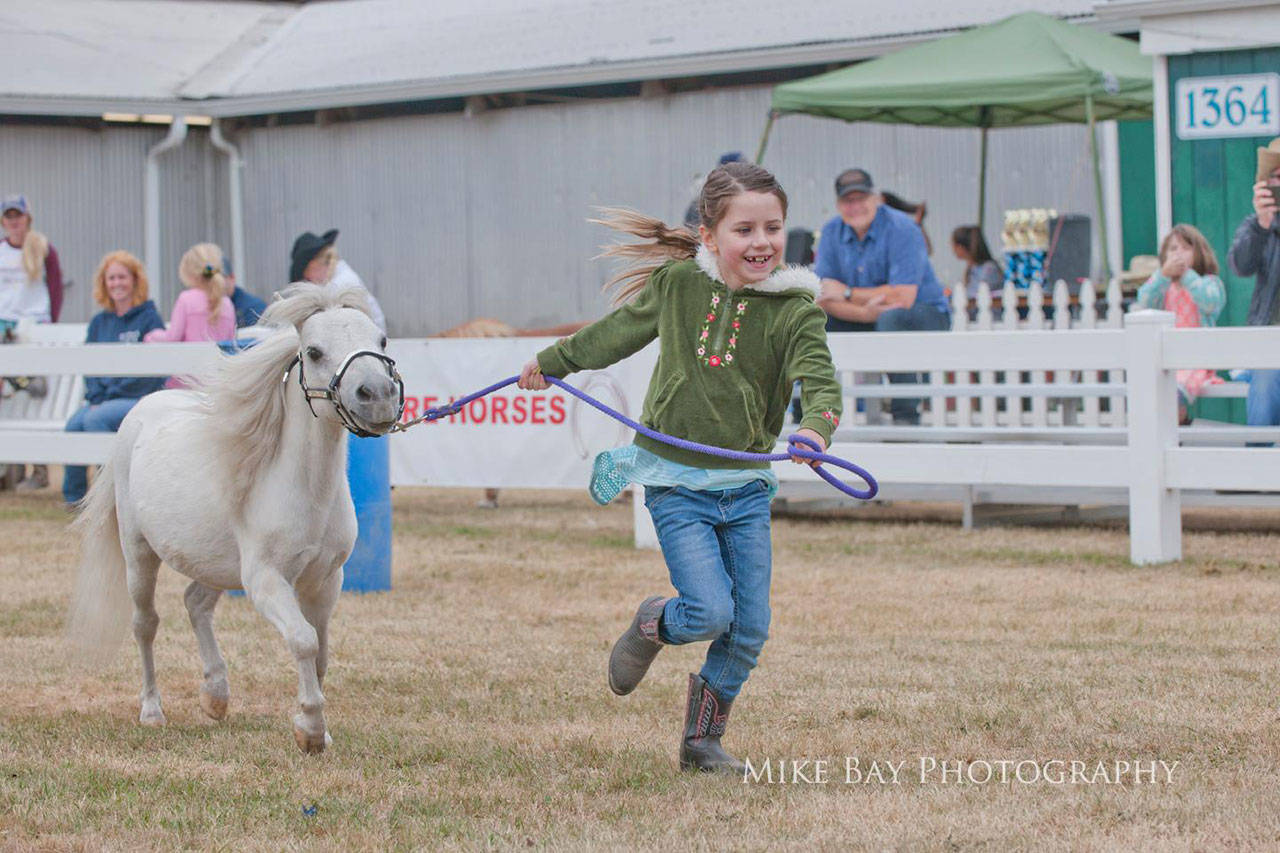They are a favorite of many children who visit the fair. And adults, too.
And without Ron and Pat Gascoyne, the miniature horses wouldn’t be a part of the Kitsap County Fair. For the past 15 years, the Seabeck couple has been the powerhouse behind the mini-horse exhibit at the fair. And it all started due to their grandchildren.
“Our grandchildren got us into this,” Ron said.
“But I wasn’t opposed to it,” said his wife Pat. “I loved the miniature horse and I thought it’d be kind of neat to have them.”
The Gascoynes have the Seven Wells Ranch in Seabeck where throughout the year, they keep mini horses and allow any child who wants to learn about them to come out at no cost.
And when it comes fair time, they pack up most or all of their eight minis and head to the E Barn on the Kitsap County Fairgrounds.
Their most well-known horse is Spanky, who’s been with them since they started keeping mini horses.
“The kids all know him,” said Ron. “They remember him from year to year. And we take him out during the year to visit schools and nursing homes.”
Minis became a part of their lives when they had a grandchild competing in mini horse in the Silver Spurs horse club. Then the couple decided to bring the minis to the fair as part of a petting zoo. From there, the minis have grown to be its own competition at the fair, separate from 4H, but run similarly with 198 classes or divisions of competition during the five day fair.
“Minis can do everything the regular horses do, except people don’t ride them,” Pat said. “They jump, and they race obstacle course, and there’s a division where they pull carts.”
The classes also are broken out into age groups.
“We have them for the novice, the older kids and the adults,” Ron said. “And this year we have a class for adult 49 and older. Some of the adults said they didn’t want to compete with the 18 year olds anymore.”
The Gascoynes are expecting about 60 mini horses to compete this year. They will be housed in E-Barn and will compete in the area next door. On Friday of fair week, the minis will compete in the new Large Equine Arena at the north end of the fairgrounds. Ron was a major part of getting that covered arena funded and built. This is the first year it will be used during the fair.
“These guys are pretty small,” Ron said on the minis. “They can get lost in that big arena. But we will have the cart pull there because there’s more room.”
One of the most popular competitions for the minis is the costume division, where kids and adults dress their minis up and sometimes, themselves, too. There have been yellow-feathered birds, clowns, military camo, and sport teams costumes.
“Everybody likes to see what the minis are dressed like,” he said. “It’s something that is special.”
When not competing the minis are in the E Barn, which also has the Gascoyne’s touch. In the past few years, along with the help of Chuck and Cynthia Edwards, they’ve remodeled the barn to look like and old-time western town.
“We were driving through Soap Lake a few years ago,” Pat said. “I saw this little Old Frontier Town there and I said ‘That’s what we should do inside the minis barn.’”
Facade along the interior walls include the lumber store, the tack and feed store, Mini-Gulch Bank and post office, anode course, Spanky’s Saloon. Local companies have provided some of the items for the decor, including Home Depot, Lowe’s and Farmland.
According the national mini horse organization, miniature horses are found in many nations, particularly in those of Europe and the Americas. The designation of miniature horse is determined by the height of the animal, which, depending on the particular breed registry involved, is usually less than 34–38 inches as measured at the last hairs of the mane, which are found at the withers. While miniature horses are the size of a very small pony, many retain horse characteristics and are considered “horses” by their respective registries. They have various colors and coat patterns.
Miniature horses are friendly and interact well with people. For this reason they are often kept as family pets, though they still retain natural horse behavior, including a natural fight or flight instinct, and must be treated like an equine, even if they primarily serve as a companion animal. They are also trained as service animals, akin to assistance dogs for people with disabilities. Miniature horses are also trained for driving, equine agility, and other competitive horse show type events.
People are drawn to the minis, Pat said, because of their size.
“They’re not intimidating like big horses are,” she said. “You can have fun with them. In our case, our grandkids even bring Spanky in the house.”
The cost of the average mini horse in this area runs about $1,000, but can be anywhere from free to $2,500. A pure bred can be as much as $250,000. In the Gascoyne’s case, some of their minis were given to them.
“People know that we have them and there’ll be people who can’t keep their mini and ask us to take them,” Ron said. “People call us and say ‘Can you re-home our mini?’ “If we can’t keep them, we find homes for them. So far this year we’ve re-homes four minis. They’re easy to keep. Just a little hay and a little feed.”
There is a local group, Kitsap Miniature Horse Club, where you can learn more about minis. Find out more by emailing the Seven Wells Ranch at sevenwells7@hotmail.com.



